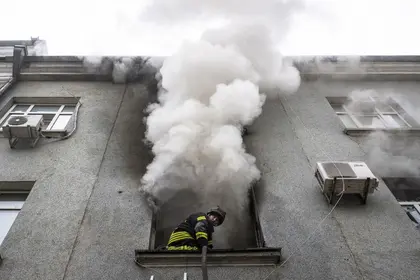Lada Koslovska, like most Kherson residents, was thrilled when Ukrainian troops liberated her beloved city. But the situation there remains grim and now she and her child are being forced to flee their home.
Koslovska, 47, said that Russian shelling of the city, which had a pre-war population of 280,000, is the main reason she and her son are abandoning their home and becoming refugees.
“Psychologically we were prepared [for the Russian shelling] but it’s very scary. What the Russians cannot keep, they will try to destroy” Koslovska told Kyiv Post. Russian troops captured Kherson on Mar. 2 with minimal fighting, then abandoned it on Nov 11 without a shot.
Ukrainian reconnaissance troops entered the city the next day and, within a week, Russian artillery from across the river was hammering Kherson homes and business.
Meanwhile, local authorities are doing everything they can to deliver food, electricity and heat.
No safe spaces
Kherson’s Dnipro River shore – still an important source of water for residents struggling without working faucets in their homes – remains unsafe to approach. Russian forces have the capacity to open fire from other side of the river, according to a Kherson city police warning.
“They [Russian artillery’ can reach anywhere – in the suburbs and areas closer to the river, using mortars, MLRS [multiple launch rocket systems] and tanks,” Koslovska said. “People say the Russians have set up a mortar close to the river, to open fire then run.

EU Transfers €1.5 Bln Raised From Russian Assets for Ukraine
They are hiding in Oleshky and Gola Prystan [on the left bank of the Dnipro River] within residential districts.” Bombardment of Kherson’s riverside and inland suburbs has, say news reports, intensified in recent weeks.
On Nov. 24, a salvo of missiles or artillery rockets hit an apartment in Kherson’s Tavrisky district, blowing three-meter-wide holes in one apartment building and injuring several residents. Some strikes involved the use of banned cluster munitions, Kherson city spokesman Oleksandr Leshchenko said in a statement.
From Nov. 20-24, Russian air strikes hit Kherson city 45 times, killing seven residents and injuring dozens, said Halyna Luhova, spokeswoman for Kherson regional administration in a statement.
No let-up
Andriy Yusov, spokesman for the Main Intelligence Directorate of Ukraine’s Ministry of Defense, in Nov. 23 television comments, said the Kremlin is likely to increase its attacks on cities like Kherson in the future.
This is put down to the Russian army running out of long-range, precision-guided cruise missiles, yet still having thousands of S-300 missiles – a weapon normally used to shoot at airplanes but able to hit a ground target at medium ranges of 180-360 kilometers. Kherson is within that range and will almost certainly be hit again and again, he predicts.
“We see that they [the Russian army] do not particularly strive for accuracy. In many cases, a miss of a kilometer is normal and sufficient [accuracy] to hit…civilian houses and hospitals,” Yusov said.
By comparison, Koslovska observes that “the Ukrainian army is very accurate” and “when our army was firing at Russians [in Kherson], even the windows in the houses nearby were intact. But now, it’s a matter of luck.”
Broken infrastructure
Even without renewed Russian bombardment, much of Kherson’s power grid, communications, logistics chains and civilian infrastructure are buckling under the pressure.
As winter approaches, local authorities are struggling to deliver sufficient food and electricity for families to survive.
Volunteer Oleska Kotoslawksy told Kyiv Post how, in most locations of the city, there is “no electricity, no water [and] almost no telephone connection.”
According to news reports, only a few bank terminals are operating in the entire city. Phone communications are generally limited to text and voice, and the closest reliable fuel stations are outside Kherson on the Mykolaiv highway.
Transformer stations and power line systems serving Kherson continue to come under fire by Russians from across the Dnipro River. Departing Russian troops are also understood to have heavily mined such facilities.
Volodymyr Kudriatsky, a spokesman for state energy company Ukrenergo, said in a UNIAN news agency report that the mines and booby traps are so dense in some locations that “demining a square meter of power grid territory can last an hour.”
Generators, batteries and flashlights are at a premium, while buying one is often impossible, journalist Konstantyn Ryzhenko wrote in his Telegram channel.
Ukraine’s recovery efforts
Regional authorities have been handing out packaged supplies to residents across the city, said Yaroslav Yanushevych, head of the Kherson regional administration.
Volunteer groups, some from afar, are understood to have moved in to fill supply gaps. Ihor Kukobko, head of Non-Governmental Organization Iskra Dobra, said his group started delivering assistance to Kherson residents three days after the Russians left.
The biggest demand at present, he said, is long-storage foods like potatoes and cabbages, candles and batteries, along with wood-fired stoves.
Yanushevych, in comments to the state-run Suspinske information platform, said the national government has designated Kherson a front-line city and will transport citizens wanting to evacuate at government cost, by bus or by train.
Koslovska‘s plan is to get out of the city, move in with her son, and help people worse off than herself. “I plan to see my older son and take my younger child to a safer place. Kherson is a front-line city. If the problems only with electricity and water, it wouldn’t be so scary, but the shelling knocks me off track,” she said.
“I want my [younger] child to spend a little while in a place. And as soon as I get to a place with a volunteer center, I can participate.”
You can also highlight the text and press Ctrl + Enter







